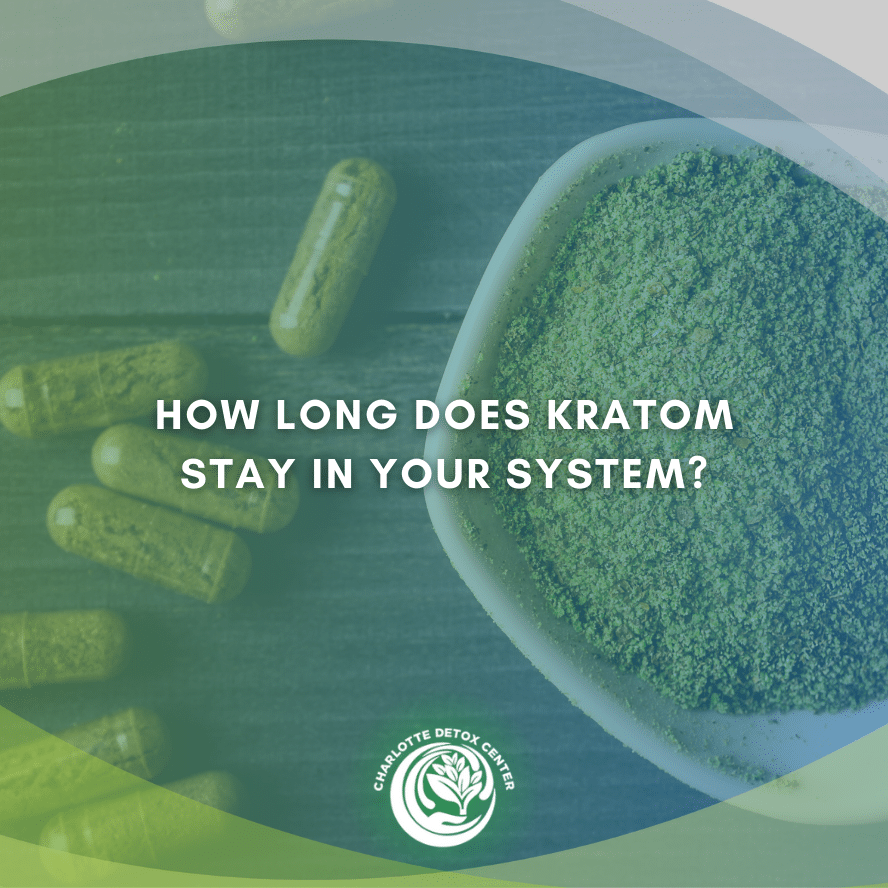How Long Does Kratom Stay in Your System?

Medically Verified: 2/1/24
Medical Reviewer
Chief Editor

All of the information on this page has been reviewed and verified by a certified addiction professional.
Kratom is a type of tree that grows in Asia. People often consume its leaves because it can produce opioid and stimulant-like effects. While kratom is currently legal, it is not approved for any medicinal use in the United States and much is still unknown about it, including whether it is safe for short or long-term use.
According to the National Institute of Drug Abuse (NIDA), 1.7 million people reported using kratom in 2021.[1]
Research is still being completed to determine whether kratom is addictive, however, studies have shown that people who abuse it experience withdrawal symptoms upon cessation of its use. If you or a loved one frequently uses kratom, you might be wondering how long it stays in your system.
What are the Effects of Kratom?
The DEA reports that low doses of kratom can produce stimulant-like effects, while high doses may cause symptoms similar to sedative drugs.[2] Most people who abuse kratom swallow it in capsule form or drink it as an herbal tea.
The possible effects of consuming kratom include:[2]
- Increased alertness
- Heightened energy
- Talkativeness
- Drowsiness or dizziness
- Tiredness or sedation
- Hallucinations and delusions
- Mental confusion
Because research is still being conducted on kratom, many of its side effects are unknown. Additionally, some people may use kratom to replace opioids as it can cause sedative effects at high doses. It is important to note that there is no official medicinal use for kratom and anyone using it to detox from opioids is doing so without medical advice.
Despite limited research, there are case studies that confirm chronic use of kratom can lead to physical dependence.[3] As a result, anyone abusing kratom should seek help from a drug rehab center.
Understanding Kratom’s Half-Life
There is no medicinal use for kratom, so research on the drug’s half-life is extremely limited. Additionally, kratom is thought to be a dose-dependent substance, meaning larger amounts of it will cause the effects to last longer.
Most studies have found that the half-life of kratom is about 24 hours.[4] It takes about 4 to 5 half-lives for a drug to be completely eliminated from your system, so kratom could remain in your body for up to 5 days. With that being said, little is known about the substance and these numbers could vary greatly depending on a wide variety of factors, including how much kratom you abuse and how often.
How Long Does Kratom Remain in Your System?
It can be rather difficult to determine how long kratom remains in your system because it is not screened for on most drug tests. Even extremely sophisticated testing methods might not detect kratom because it is not a popular and widely known drug of abuse.
There are specialized drug panels that can test for kratom (mitragynine) and its metabolites. However, saliva, blood, and hair tests are not known to be used for kratom testing. With specialized urine drug tests, it might show up for up to 7 days after your last dose.
Factors that Affect How Long Kratom Stays in Your Body
With a substance like kratom, several factors can play a role in how long it remains in your system, including:
- Body weight
- The dose of kratom
- How often kratom is being abused
- Age
- The presence of other substances
- How fast your metabolism is
- Overall health and specific medical conditions
While some studies show that urine tests may detect kratom in your system for up to 7 days, this can vary from person to person. Someone who abuses kratom frequently may test positive longer than an individual who is an occasional user. Additionally, because kratom is fat-soluble, heavier individuals may test positive longer than thinner people.
Find Help for Kratom Abuse and Addiction
If you or a loved one regularly consumes kratom, you could become addicted to it. Unfortunately, kratom can cause withdrawal symptoms among dependent individuals, so it’s helpful to attend a medical detox program. Without medical detox, you could relapse on kratom and become trapped in a cycle of addiction.
Thankfully, Charlotte Detox Center can provide you with the treatment and support you need to overcome kratom withdrawal. To learn more about how we can help you regain control over your life, contact us today.
References:
- The National Institute of Drug Abuse (NIDA): Kratom, Retrieved September 2023 From https://nida.nih.gov/research-topics/kratom#scope
- The Drug Enforcement Administration (DEA): Kratom, Retrieved September 2023 From https://www.dea.gov/sites/default/files/2020-06/Kratom-2020_0.pdf
- The National Library of Medicine (NLM): Validation of Krathom (Mitragyna speciosa Korth.) Dependence Scale (KDS): a dependence screen for internationally emerging psychoactive substance, Retrieved September 2023 From https://pubmed.ncbi.nlm.nih.gov/24853660/
- The National Library of Medicine (NLM): Pharmacokinetics of mitragynine in man, Retrieved September 2023 From https://www.ncbi.nlm.nih.gov/pmc/articles/PMC4425236/
